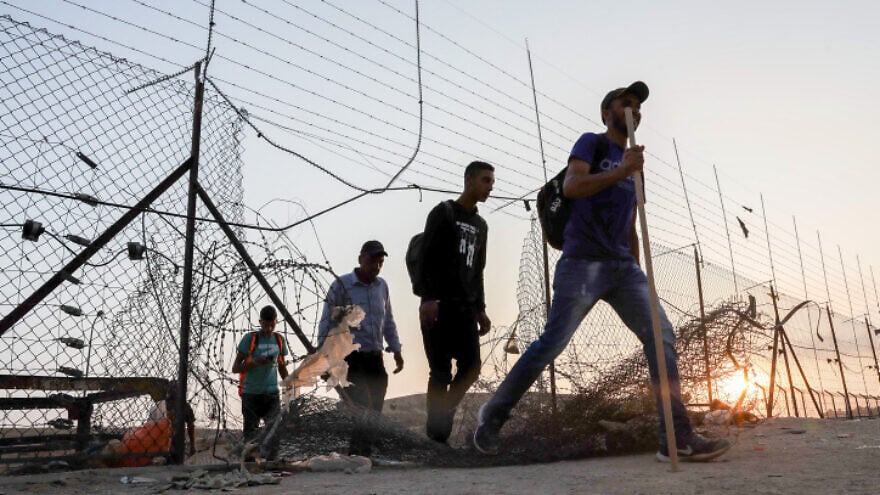‘Since October 7 we can’t be patient regarding terror anymore,’ said resident of area near Israel’s security fence.
By Noah Michaeli, TPS
In the very center of the State of Israel, just northeast of Tel Aviv, local communities in the coastal plain are preparing for terrorist infiltrations.
The rise in Palestinian terror has significantly impacted these communities, which sit right on the other side of the border fence from the Palestinian Arab cities of Tulkarem and Qalqilya.
“Before October 7 we would hear sounds of gunfire and explosions [from the other side of the fence], and they would tell us that it’s just them celebrating. But after October 7 we’re no longer so naïve,” Bat Hefer resident Etti Itzcovich told The Press Service of Israel. Itzcovich is also the Director of the Seam Zone Forum, which advocates for the security of the region’s residents.
“Since October 7 we can’t be patient regarding terror anymore,” she added. “We refuse to accept this situation. We want to prevent the next disaster.”
The Seam Zone — home to communities like Bat Hefer, Alfei Menashe, and Elkana — is geographically part of Samaria but on the Israeli side of the 1949 armistice line.
The region has seen a significant rise in terror attacks since the start of the war, and residents now fear an October 7-style mass infiltration attack. Despite the Israel Defense Force’s current counterterror operation in northern Samaria and the Jordan Valley, many residents feel that they have already been left to fend for themselves.
“From the fence, we’ve seen terrorists building fortifications right nearby,” Itzcovich said. “They shoot at our walls and run away. We’re tired of the terror.”
Asked about the army’s counterterror raids — the largest in months — Shimon Tzaraf, chairman of Moshav Nitzanei Oz’s security committee, told TPS-IL, “I’m very satisfied by what the IDF is doing there, but less satisfied by how they’ve helped us until now.”
He added, “But there is no end to the work that needs to be done there.”
After the October 7 massacre, Seam Zone residents understood that the danger was immediate.
“We started to build our own system of defense,” Tzaraf explained. “From October 7 until today, we’re trying to build a better fence, and to properly arm, equip, and prepare ourselves, and we’ve done it all alone.”
Government and military assistance has been minimal, he added. “In recent months the country has woken up a bit about the situation here, but we still haven’t received a lot of help,” Tzaraf said.
Today, Nitzanei Oz and surrounding communities are defended, but almost entirely by reservists and unpaid volunteers. Communities have been beefing up their kitot konenenut — civilian security teams — after the ones near the Gaza border were overwhelmed by Hamas on October 7.
Despite an immediate uptick in violence following October 7, the army didn’t take offensive steps in the region in the first months following the attack, Tzaraf recalls.
“Around March, the IDF started to go on the attack and now is starting in earnest,” Tzaraf said. “It understood that until now it hadn’t properly assessed the security situation in Judea and Samaria. It took them a few months to understand the significance of what happens there, and the potential danger.”
Even 11 months later, there’s still a lot of fear in the Seam Zone region, Tzaraf explained, “Because we understand the abilities of the other side, and have fully woken up to the danger.”
Security considerations impact almost every decision, including how to safely send children to school. In community WhatsApp groups, anxious parents worried about sending their kids to the first day of school, given the security situation.
“Just hope those bastards don’t surprise us tomorrow,” one resident wrote before the school year began on Sunday.
Another asked if it’s “even safe to send kids on the bus tomorrow” and a third added “I didn’t see any security at the kindergartens. Should there be any?”
Ultimately, the communities all came together to find a creative solution to keep their children as safe as possible.
“We have nine bus stations in Nitzanei Oz,” Tzaraf says. “At every bus station on the first day of school, we placed armed guards and had volunteers to accompany them to school. We’re already used to all this. We’re Israelis, We know how to get used to anything.”
Said Itzcovich, “Nobody knows what will happen. But we need to ensure that whatever happens, we can live in security.”
Do You Love Israel? Make a Donation - Show Your Support!
Donate to vital charities that help protect Israeli citizens and inspire millions around the world to support Israel too!
Now more than ever, Israel needs your help to fight and win the war -- including on the battlefield of public opinion.
Antisemitism, anti-Israel bias and boycotts are out of control. Israel's enemies are inciting terror and violence against innocent Israelis and Jews around the world. Help us fight back!
